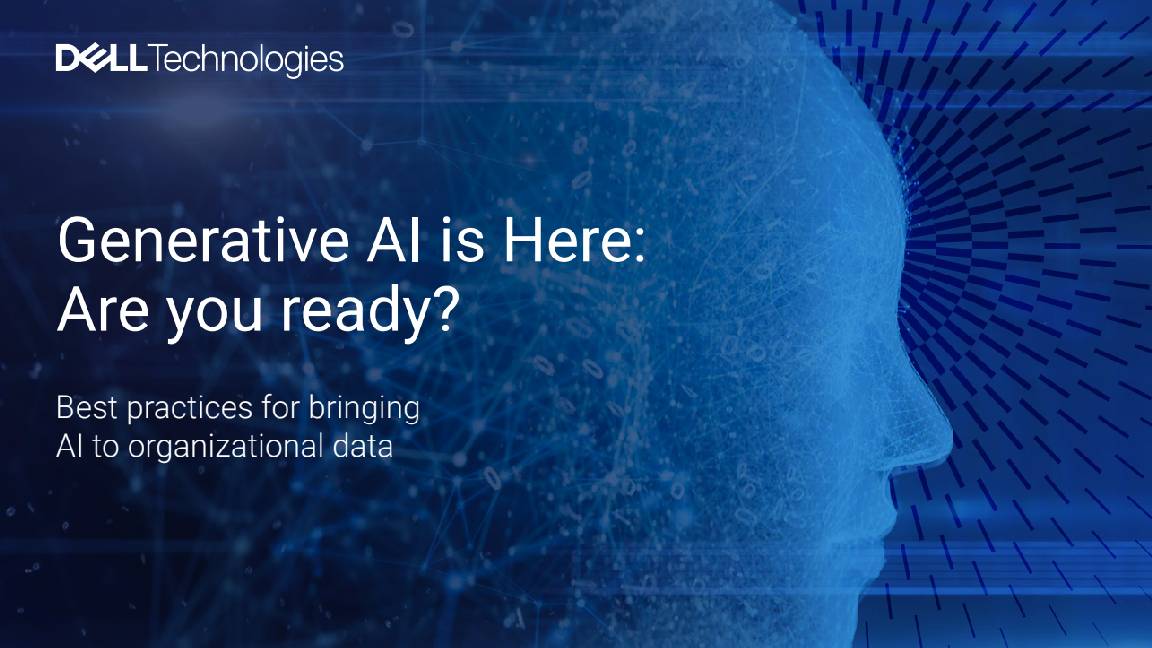Dell UK CTO: “IT cannot afford to be seen as the innovation bottleneck” when it comes to AI
Collaboration across all teams, not just IT, could make all the difference when it comes to deploying AI across one’s entire supply chain


As businesses look to adopt AI at a greater level than ever before, knowing where to start and the right approach to take is key to ensuring investment is well-placed and pays off. But to make the most of this technology, leaders might need to rip up ideas of handing tech tasks off to their IT teams, favoring a more collaborative approach.
In conversation with ITPro, Arash Ghazanfari, CTO UK at Dell Technologies, says that there is a real case to be made for more joined-up decisions on AI, which will be necessary to unlock its benefits and overcome the immense data management challenges it presents.
Ghazanfari says that executive interest in generative AI has brought AI to the boardroom to an extent that it had not previously been. However, he cautions that the growing adoption of the technology has also increased the urgency of getting one’s data strategy in order.
“[Generative AI] is something that we haven't had before. While that in itself has captured the imagination of everyone and has brought AI to the forefront of board-level decision-makers, it has also increased the importance of having a comprehensive data strategy and a much more robust need around data governance.
“When you combine these factors, IT cannot afford to be seen as the innovation bottleneck. There needs to be closer collaboration between IT and business decision-makers.”
With this in mind, Ghazanfari says businesses must focus on consolidating their strategy for bridging the gap between these AI workloads and their data, in conversation with partners and with an eye on their entire supply chain.
Ghazanfari gives the example of a conversation he had with a VP of smart manufacturing for a well-known company, who told him there’s still far too little communication and understanding between IT and other departments within the organization.
Sign up today and you will receive a free copy of our Future Focus 2025 report - the leading guidance on AI, cybersecurity and other IT challenges as per 700+ senior executives
“He was saying that IT is only just beginning to work out what's at the end of the wire, because there is that clear divide between IT and operational technology. I think there is definitely a need to bring these two worlds together and that can be a challenge organizationally.
“So, one of the approaches that we take when we engage our Professional Services, is to ensure that all the right stakeholders from across the business are involved in the conversation so that you build consensus around what that big picture looks like. And that certainly must include stakeholders outside of IT in order to drive success in the inner organization.
“It's more than just a technology challenge. Actually, I think that the technology piece is the easy part.”
Leaning on advisory services for AI
In his conversations with business decision-makers, Ghazanfari says there is broad acknowledgment of the fact that AI workloads such as large language models and enterprise data form a widely distributed and differentiated environment that is difficult to oversee.
“So it's focusing the minds around where these workloads and data sets are going to be deployed and it really elevates the importance of organizations being in control of their digital supply chain end-to-end. So where is my data captured? What am I doing with that data? What am I doing with the insights?”
“Lessons have been learned” from the cloud-first approach that companies took in the 2010s, Ghazanfari tells ITPro that, in his experience, organizations are keen to seek out advisory conversations with service providers like Dell to ensure they have a proper strategy in place prior to adoption.
Dell Technologies offers AI adoption services to its customers, having announced an expansion of its Professional Services for AI offering last year and expanded this with its recently-announced Dell AI Factories.
“What I'm seeing at the moment is business stakeholders starting small,” he explains, “Creating environments where it can prove the value, and then they look at advisory organizations or technology leaders like Dell to help them scale those initial Innovative efforts that they have made.”
This is in line with what John Roese, global CTO at Dell, told ITPro at Dell Technologies World 2024 – that companies are failing on AI adoption because of a lack of clear ideas, governance, and a desire to do too much at once.
Professional services, Ghazanfari adds, can help address AI skill shortages, with knowledge transfer between staff on an ongoing basis an important part of any organization’s AI strategy.
“It's not just a technical challenge, it’s also an organizational challenge. Who owns the data, for example, within a given organization, and do you actually have the right to monetize that data from a regulatory perspective?
Some firms have responded to the challenge of AI adoption by appointing bespoke executives to the task – chief AI officers (CAIOs). But Ghazanfari tells ITPro that while CAIOs can be a great addition to the boardroom, they can only improve matters in line with their organizational culture.
“I think it's a good idea if the chief AI officer role transcends across IT and business. If it's a very technology-centric function, it will have limited success. So I think that whole space is very exciting and it's going to evolve in the next few years, but yes there is definitely a need for having a chief AI officer – particularly if you're serious about leveraging AI ethically and responsibly, that’s going to be a major part of that.
Benefits of AI at the edge
“I think people are starting to realize that actually it's easy to start in the cloud – but it can be extremely expensive and costly to scale in the cloud. It depends on where your data is actually generated,” he says.
“It’s increasingly becoming obvious to our customers that there is a need to bring AI to your data, rather than taking data to the cloud. Now, we believe that hyperscalers are playing a key role in accelerating innovation and they are part of the answer, the solution.
Ghazanfari says that while Dell acknowledges the important role for AI innovation that hyperscalers are playing, there is a regulatory and data management piece to be made for moving AI to data rather than moving data to the cloud.
“Increasingly, when we start looking at the level of data that is being generated at the edge, that will surely have an impact on data security, data gravity, having control over the data, your regulatory obligations to your customers and market.”
RELATED WHITEPAPER

Dell Technologies sees potential for AI at the edge in sectors such as manufacturing, healthcare, and retail. Ghazanfari gives the example of a cancer healthcare provider that Dell helped to optimize its data supply chain and move workloads closer to where data is generated, which reduced the time to detection from 12 days to just over 24 hours.
He adds that the manufacturing sector can benefit from a data-driven approach rooted in technologies such as AI. Manufacturing accounts for 9.3% of the UK’s GDP, per House of Commons data, and Ghazanfari notes this in the context of the important role he believes AI can play in stimulating productivity throughout the region.
“You’re dealing with connected industrial assets on the smart factory floor. Typically, you’re dealing with operational technology but there is vast amounts of data currently being generated on the smart factory floor and in order to tap into these data sets, it makes sense to have AI workloads closer to the data.”
The UK’s AI potential
When it comes to UK-specific uptake of AI, there is evidence of strong AI potential. Recent research by Dell Technologies found that 71% of UK respondents were in the “early-to-mid” stage of their generative AI adoption compared to 58% globally, and only one point behind the global 82% who say they have a clear strategy for AI. The research took in responses from 6,600 business respondents around the world.
“I think the UK has been historically more conservative, but at the same time I think we are also the bedrock of innovation,” says Ghazanfari, noting that with the right approach it could prove a fertile region for AI breakthroughs.
“In this country, we have made significant investments, particularly the work that we are doing with Cambridge University, that’s gaining a lot of traction. I think with the new government there is going to be a focus on closer partnerships between the public and private sector, and I only see that space accelerating in the coming months and years.”
Going forward, Ghazanfari sees great potential in the UK’s ability to support and promote green data centers through rapid investment in renewable energy, which can help to drive the sustainability of innovative technologies like AI.

Rory Bathgate is Features and Multimedia Editor at ITPro, overseeing all in-depth content and case studies. He can also be found co-hosting the ITPro Podcast with Jane McCallion, swapping a keyboard for a microphone to discuss the latest learnings with thought leaders from across the tech sector.
In his free time, Rory enjoys photography, video editing, and good science fiction. After graduating from the University of Kent with a BA in English and American Literature, Rory undertook an MA in Eighteenth-Century Studies at King’s College London. He joined ITPro in 2022 as a graduate, following four years in student journalism. You can contact Rory at rory.bathgate@futurenet.com or on LinkedIn.
-
 Trump's AI executive order could leave US in a 'regulatory vacuum'
Trump's AI executive order could leave US in a 'regulatory vacuum'News Citing a "patchwork of 50 different regulatory regimes" and "ideological bias", President Trump wants rules to be set at a federal level
-
 TPUs: Google's home advantage
TPUs: Google's home advantageITPro Podcast How does TPU v7 stack up against Nvidia's latest chips – and can Google scale AI using only its own supply?